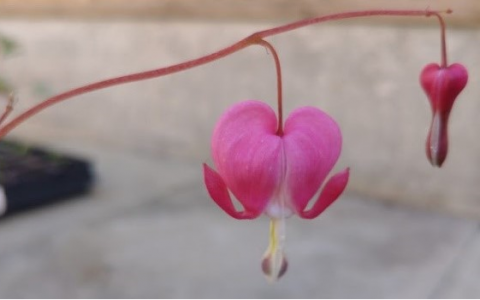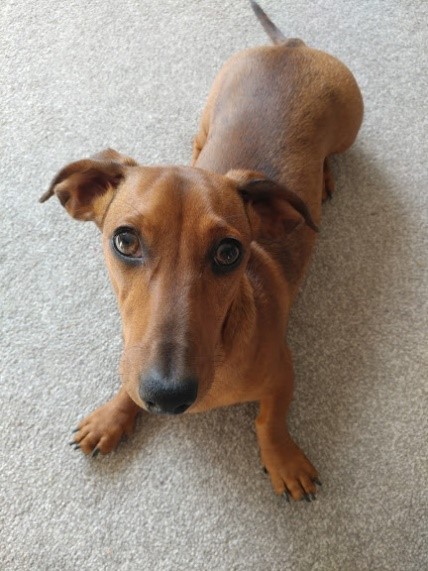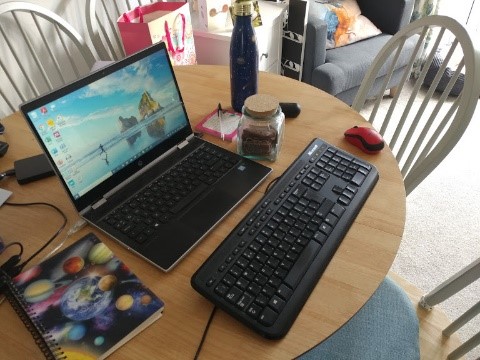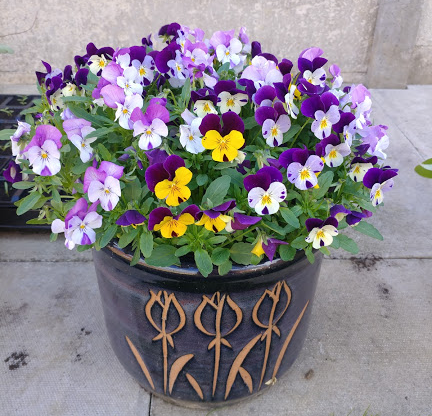You are here
- Home
- Lab-based PhD student adjusts to working from home
Lab-based PhD student adjusts to working from home

Since the 17th March, I have been working from home, like many others, owing to the government guidelines in response to COVID-19. I thought I would use this opportunity to express my personal real-time feelings as COVID-19 developed, in the very lucky position without experiencing any financial or health difficulties, merely the social and work life differences that have come with the pandemic.
The build up
I remember a couple of months into 2020 having lunch with my colleagues in the social area near our office on the Milton Keynes, OU campus. At this point it was beginning to become apparent from the news that the Coronavirus was getting worse in Wuhan, Hubei province, China and that there was the potential for this to spread across the world. I remember hearing for the first time the measures China were taking to reduce the spread of infection, and at that point having some faith that they would be able to contain it.
Only later, when there were reports of cases outside of China, including Italy, which led to rising fear over people that had travelled to Italy for February half-term, did the severity of this disease become more apparent and speculation begin to take hold. Social times became bombarded with “I heard…” or “I wonder if…”, which led to anxiety. At the time, I honestly did not imagine it would turn into the pandemic it is today, and felt frustrated internally, because without any official news on any measures we would personally need to take, we had no choice but to continue work as if nothing had changed.
I think feelings of uncertainty and frustration were intensified because of the big international conference I was preparing for, the 51st Lunar and Planetary Science Conference (LPSC) in Houston due to take place between the 16th and 20th March 2020. When we found out the European Space Agency employees were grounded and forbidden to attend the conference speculation spiked raising questions like “Will you be allowed to go to the conference?”, “Will the UK or the OU not allow you to go?” and “Will the conference be cancelled?”. I found this stressful and unhelpful, because still with no official advice and I had no choice but to prepare my poster for the conference like nothing was different. And finally, on the day I printed the poster, 8 days before we were set to fly out, the conference committee announced the cancellation of the conference. Luckily, I had booked everything for the conference through the official University booking system, so everything was cancelled, and refunds returned without issue.
The fall
Instead, what was left was something I had not anticipated. A chasm of time in which I had nothing to do. I had been so focussed on not letting the speculation make me scared or uncertain that I had not actually prepared for the eventuality of the conference’s cancellation. Yes, it was just one week away, but as a PhD student, with just your PhD work to worry about, you find yourself working to short term deadlines, waiting for labs to become available and samples to be prepared, and concentrating hard on how each part fits into the wider message of your PhD. So, for this conference, an important deadline I had set for myself, to be cancelled I felt like the momentum had been swept out from underneath me.
In my second year, I am at the point in my PhD when I should really be spending most of my time in the lab gathering results for my thesis. However, I was already experiencing delays to the lab work I had intended to do before and after the conference for reasons completely unrelated to COVID-19. Therefore, without the conference to attend or the lab work to complete I felt lost as to what to do.
Within 12 days I began working from home, but still with the hope that I would be able to continue at least some lab work, however this gradually slipped away as COVID-19 began to disrupt external facilities and the supply of consumables, meaning that each project got suspended one by one.
Looking on the bright side
In the short term I turned my attention towards writing up what I could about the projects I was working on, which kept me occupied for a few weeks. I am thankful to work at a University so well equipped for working virtually! I set up my workspace on the dining table, with my fiancé working in the study upstairs and Monty, our 9-month-old miniature dachshund puppy, swapping between rooms he preferred to snooze in. Now having been working at home for almost two months it feels like the time has whizzed by! The extra time I have been able to spend with my fiancé and puppy have been glorious, especially with the warm weather we have been having. We’re very lucky to have a garden we have been able to spend as much time in as possible, and it has certainly benefited greatly from the increased attention. We have even had the time to book our wedding venue for 2022!

Our 9-month old miniature dachshund Monty

My dining table workspace - with vital confectionary equipment
.png)
We dug out the flower bed and laid the path next to the chicken hutch

More plants in the garden
Making some tough decisions
However, on the reverse it has been a struggle to find a normal working routine and environment. Like many we feel more tired and unmotivated than we were before. I am definitely someone that benefits from a work environment being different from home and leisure, so have found the adjustment to working from home challenging and less productive.
Then as things looked like they would continue indefinitely, I was forced to consider alternative approaches to lab-based research. This directed me towards computer modelling, not originally intended to constitute any of my PhD, however it has now grown in importance and may occupy a whole chapter of my thesis. I now have a research purpose to work towards and I feel happier and more motivated to get this done before my new deadline - the end of this lockdown. I do not want to still be doing this when we are allowed back in the lab again!
What I will take away from this
During this experience I have learnt a lot about myself as a researcher. I understand now that contingencies must include an alternative approach that assumes you will have access to very little, which may appear drastic and extremely unlikely, but would prepare for the extremely disruptive events we are living through right now. Furthermore, I have greater understanding of what keeps me motivated and how I can improve my productivity when things are turned upside down. I aim to stay calm; keep eating, drinking, and doing exercise; use distractions like puppy cuddles to drive me forwards; and find lots of things to do! I have been spending my spare time on dog walks, binge watching TV programmes and films, doing virtual pub quizzes, baking, gardening, playing computer games and doing a paint-by-numbers. My fiancé has said that this lockdown suits the younger generation that are happy to spend vast amounts of time playing video games!
I am lucky that this lockdown has only negatively affected my motivation and productivity at work and that overall I remain happy and healthy. However, uncertainty remains in the back of every member of society’s mind as to when the lockdown might end and what society may look like after it does and how long the effects of this period will last. This has been a fascinating time to be alive, and I hope writing down these feelings will help me to remember their complexity, because when future generations ask us about what it was like to live through Coronavirus we may summarise the experience as “well, we had to adapt to being at home, rely on virtual ways to stay connected with friends and family, and when we had to go out we had to exercise social distancing.” However, we must remember that each and every person has experienced unique and complex feelings, emotions and difficulties during this period. But we can get through this by remembering, we’re all in this together, and we will see each other again.
